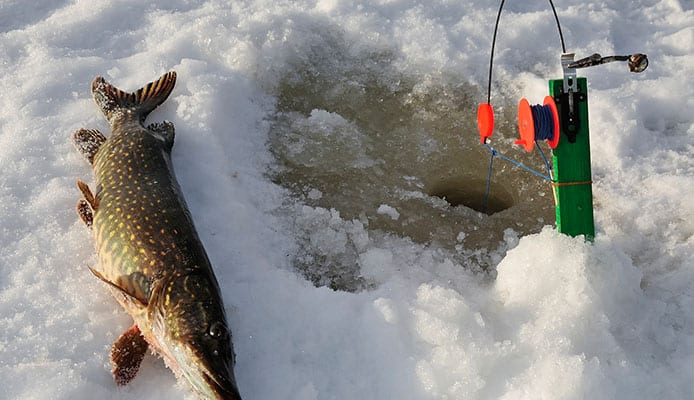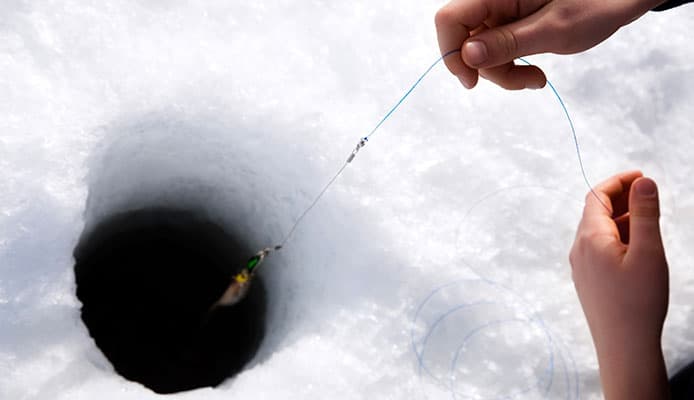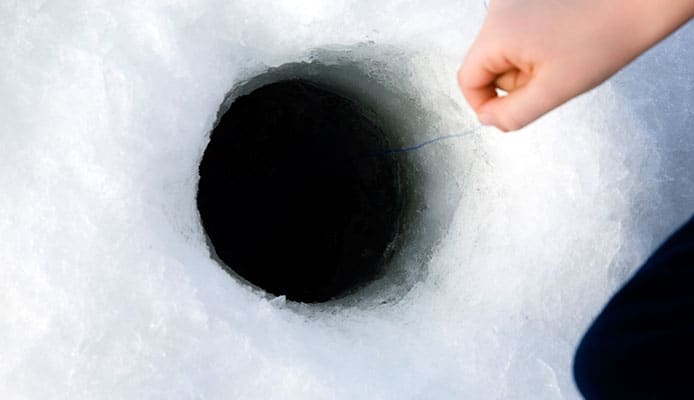-
1.
-
2.
-
3.
-
4.
-
5.
Not just any fishing line will do for ice fishing. It is hard water fishing and it is hard on line. You need a fishing line that can withstand the cold temperatures and abrasive conditions and that is easy to work with when it is freezing and will increase your catch rate. This is why you need to invest in the best ice fishing line for your ice angling excursions. You can’t go wrong with the ice fishing lines we’ve reviewed below. They satisfy the above requirements, are strong and durable so they offer the best value for your money and are top rated for their performance on the ice.
Ready to get started? Let’s go.
OUR TOP PICK
KastKing SuperPower Braided Zero Stretch
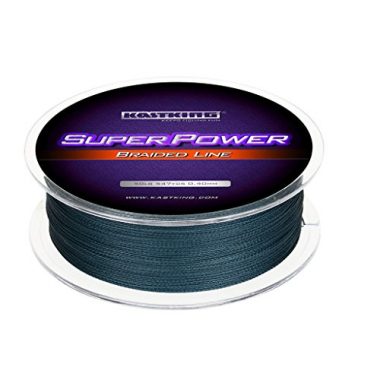
- Stand Out Features - Why We Love It
- Amazingly tough, abrasion resistant, and durable
- Incredible sensitivity
- High tensile strength
- Zero stretch and incredible sensitivity
- Versatile fishing line
- Affordable and incredible value
- A wide range of test strengths, lengths, and colors
EDITORS CHOICE
Piscifun Superline Abrasion Resistant Braided
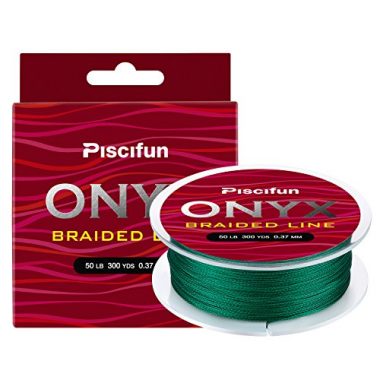
- Stand Out Features - Why We Love It
- Superior abrasion resistance and durability
- Low memory, minimal stretch, and high sensitivity
- Round, smooth, and supple
- Versatile all around fishing line
- Variety of non-fading colors
- Affordable and excellent value
BEST VALUE
Reaction Tackle High Performance Braided
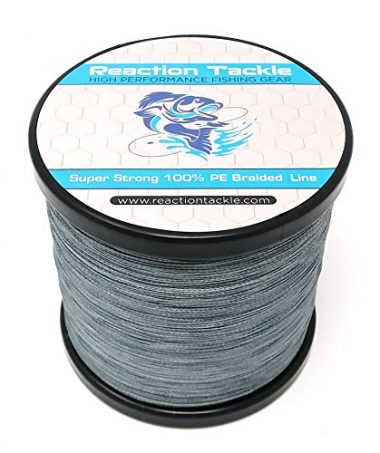
- Stand Out Features - Why We Love It
- Low visibility as well as bright colors
- High quality and durable construction
- Zero stretch and high sensitivity
- High strength and abrasion resistance
- Thin, round and smooth so easy to work with
- Customer service is great
- A superior line at a bargain price
Berkley Trilene Micro Ice, 2lb/0.9kg, 110yd/100m
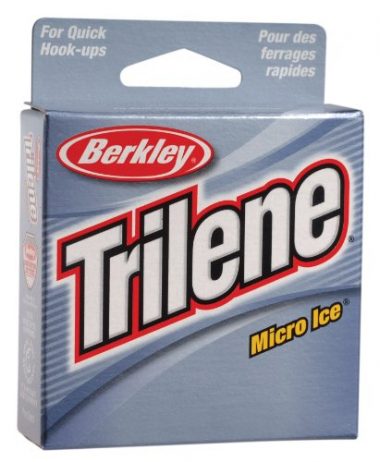
- Stand Out Features - Why We Love It
- Made for ice fishing
- Enhanced strength
- Low visibility under the water
- Low stretch design
Sufix 832 Braid
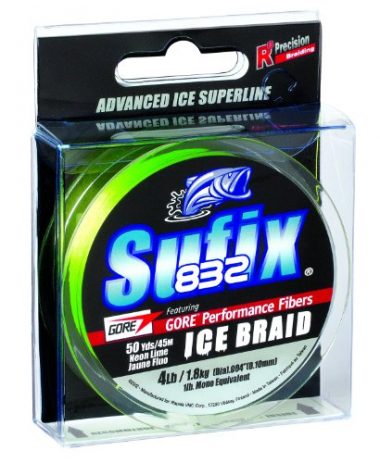
- Stand Out Features - Why We Love It
- Strong, high abrasion resistance, and durable
- High sensitivity for bite detection
- Easy to manage in sub-zero temperatures
- Low line memory and few line issues
- Resists ice buildup so it doesn't freeze
Berkley Trilene Cold Weather
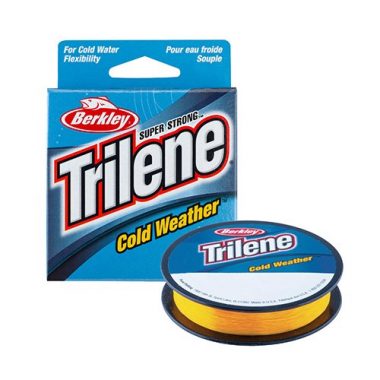
- Stand Out Features - Why We Love It
- Cold weather resistant
- Enhanced flexibility
- Strong and tough
- Low memory and reduce line issues
- Manageable in cold conditions
- Resists abrasions and cuts
Sufix Magic
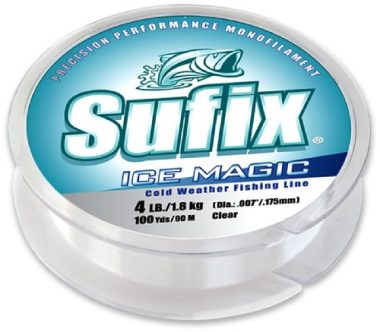
- Stand Out Features - Why We Love It
- Withstands extreme cold well
- Excellent manageability on ice
- Good strength and durability
- Reduced water absorption
- A versatile all-temperature line
- Low memory and visibility
Berkley Trilene 100% Fluorocarbon
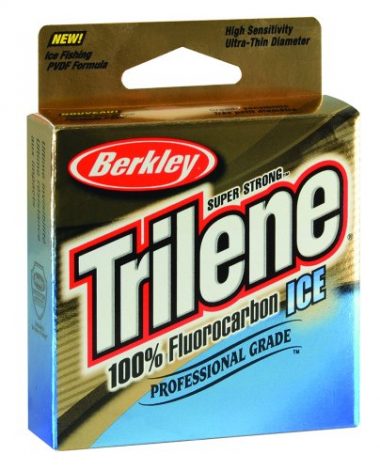
- Stand Out Features - Why We Love It
- Optimized for ice fishing
- Low stretch and great sensitivity
- Highly invisible fishing line
- Easy to handle on ice
- Improved memory and reduced line issues
- Strong, abrasion resistant and durable
- Incredible value
P-Line Floroice Clear
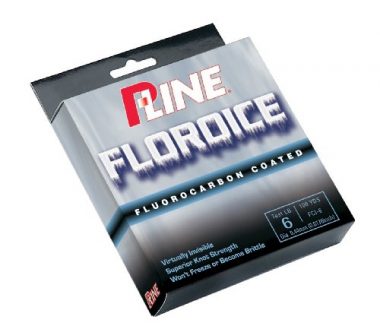
- Stand Out Features - Why We Love It
- Invisible to the fish
- Low line memory
- Excellent manageabilit
- Very strong, abrasion resistant, and durable
- Resistant to freezing and brittleness
- Ties strong knots
Celsius Tip Up Line, 15-Pounds, 50-Yards
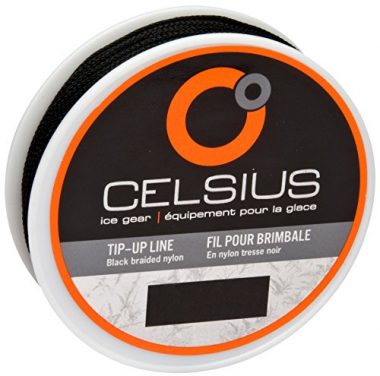
- Stand Out Features - Why We Love It
- Smooth flowing tip up fishing line
- Manageable in icy conditions
- Resists kinks and freezing
- Strong and capable of the job
- Inexpensive and good value
How To Choose The Best Ice Fishing Line – Buying Guide
To ensure your fishing line will withstand the harsh conditions on the ice, be strong enough to resist fraying and breaking, handle the vertical fishing style and help you catch fish, here are the things to look for when choosing an ice fishing line.
Visibility
In winter, fish limit their movements to conserve energy. From their still position, they are able to study your bait before deciding whether it is worth going for. An invisible fishing line is the only way to fool such observant fish. If they can see the line, they will get spooked and won’t bite. Fluorocarbon lines have excellent invisibility under water.
Strength
Ice fishing is a vertical fishing technique and the best ice fishing lines are high-strength to be able to lift the fish out of the water without breaking off. Ice is also abrasive and the sharp, jagged edges left by your auger will weaken and even neatly cut weak fishing lines. Ensure the line you choose is built strong using strong fibers and weaving techniques that create tough fishing lines with high tensile strength and superior abrasion resistance and durability.
Brittleness
Extreme cold has the effect of making regular fishing lines freeze up and become brittle and prone to breakages. Ensure you choose a fishing line with a water-repellent coating so it doesn’t absorb water and can resist freezing, brittleness, and breakages. A line that remains supple and flexible in the cold temperatures is easier to handle.
Sensitivity
In freezing waters, fish are less active and bites tend to be subtle and harder to feel. An incredibly sensitive line with low memory and little to no stretch is crucial so can feel every movement in the line and know when you have a bite and need to set the hook. Braided line is the most sensitive followed by fluorocarbon line.
Line Memory
The best ice fishing line has zero to low memory. This means that it doesn’t retain the coiled shape it takes when spooled. It stays straight so it delivers the best lure presentations and transmits even the slightest of strikes on the lure. A high memory line will hang in spring-like coils, have a lot of slack, reduced sensitivity, improper bait presentations. Braided line has near zero memory and fluorocarbon has the worst memory.
Friction Strength
Ice fishing lines are subjected to a lot of friction, which can lead to fraying and breakages. A good ice line is constructed using strong fibers and technology so it has superior abrasion resistance and won’t weaken or break when repeatedly dragged against the sharp, jagged edges of an ice hole when lifting fish through the ice hole.
Weight
Fishing lines are assigned weight ratings in pounds or kgs according to the weights they’re designed to handle. Ensure that you choose a line with a pound test rating that will work with the ice fishing rod, lure weights you will be using and is capable of lifting the fish sizes you’re likely to land vertically against gravity. If you’re using a 6 lb line and get a big 12 lb fish hooked, the line will most likely break and you will lose the fish.
Type
Ice fishing line types are the usual monofilament, fluorocarbon and braided fishing lines but they are built tough to withstand the harsh conditions. There are also copolymers and ice fishing tip up lines. Here are the different types of lines and their pros and cons on the ice.
Monofilament Line
Monofilament is the most popular go-to ice fishing line because it is strong, durable and easier to handle in cold conditions. It has less memory than fluorocarbon so presents fewer coils and tangles. Its low stretch delivers solid hook sets and gives you better control of your lures. It is also inexpensive but is not very good at resisting abrasion and requires frequent replacements.
Related Review: Monofilament Line
Fluorocarbon Line
What makes fluorocarbon line good for ice fishing is its excellent invisibility in water and superior abrasion resistance. It sinks readily and is very good at delivering lures down deep. Its low stretch gives it good sensitivity and bites detection. Its downside is its high memory and coils which are made worse by frigid weather.
You might also be interested in:
How To Ice Fish – Ice Fishing Tips
Braided Fishing Line
Braided line is an excellent fishing line because of its ultra-thin diameter, high strength, zero stretch, low memory, and incredible sensitivity. Its cons are that it is highly visible to the fish and is prone to ice build-up because it readily absorbs water. It is the go-to for fishing in deep waters or when fishing from a warm ice shelter.
Copolymer
Copolymers perform very well in freezing conditions. They have low memory and stay straight and supple, resist water absorption, and have excellent abrasion resistance. Their sensitivity is also good.
Tip Up Line
This is usually a type of braid that is made smoother to resist kinks and come off the spool smoothly when a fish bites the bait.
Color
Brightly colored lines in neon hues such as green, orange and red will give you an edge when ice fishing where bites can be so light that it can be hard to feel them. It will be easier to detect bites by watching the action of the line. To ensure that fish aren’t spooked by the bright line, attach an invisible fluorocarbon line via a knot or swivel.
Resistance To Cold Temperatures
You need a line that can withstand the freezing temperatures and perform as expected. Regular lines react to the cold in ways you won’t like. They stiffen, warp, and snap. Ice fishing lines are built for the cold using anti-freezing and water-repellent coating.
FAQs
Q: What Is Ice Fishing?
Ice fishing is the practice of catching fish through holes drilled in the ice on a frozen water body, which can be a lake or river. Here is how it goes: you layer up to ensure you will be warm out there. You head out with your ice fishing gear. You look for the perfect fishing spot and use an ice auger to drill a hole to expose the water beneath. You drop your lure through the hole and wait for a strike.
Q: Why Do I Need A Special Ice Fishing Line?
You need a special ice fishing line because ice fishing is a unique angling technique with its own challenges. You need a special ice fishing line that can withstand the extreme cold and abrasive conditions and is easier to handle in the cold.
You can take your regular line ice fishing but don’t be surprised if it gives you a hard time and ruins your experience as you have to deal with line snaps, frozen, brittle lines, and stiff knots. However, there are some great all around fishing lines built with superior strength and abrasion resistance so they can be used on the ice as well as for open, warm water fishing.
Q: Can I Use One Line for All Types Of Fish?
Fishing lines are designed to handle specific fish sizes. There is no one line that is suitable for all types and sizes of fish. For example, if you have a 3 lb line and you hook a 6 lb walleye, the line is likely to break on you leading to you losing the fish.
Globo Surf Overview
Having the best ice fishing line sets you up for successful fishing expeditions every time you choose to brave the harsh conditions. Our list includes some of the best ice fishing lines made by dependable brands such as Berkley and Sufix. There are also other great ice fishing lines you can consider like the Ice-Tec power pro ice fishing line. We hope that our ice fishing line reviews and buying guide will make it easy for you to find the best line for your needs. Remember to layer up for warmth and stay safe on the ice.
More Ice Fishing Reviews:
- Ice Fishing Tip Ups
- Ice Fishing Bibs
- Ice Fishing Flashers
- Ice Augers For Fishing
- Ice Fishing Rods
- Ice Fishing Heaters
- Ice Fishing Fish Finders
- Ice Fishing Shelters
- Ice Fishing Reels
- Ice Fishing Gloves
- Ice Fishing Boots
- Ice Fishing Suits
More Fishing Line Reviews:
Which of the ice fishing lines in our list is your top choice? We would love to read your thoughts or experience with the ice lines we’ve reviewed! Let us know in the comments box below!



